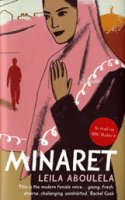Book Review: Leila Aboulela's Minaret
by anna battista

When Leila Aboulela’s latest novel Minaret opens, Najwa, the main character, is entering the flat where she is to start work as a maid. "I've come down in the world. I've slid to a place where the ceiling is low and there isn't much room to move,” Najwa states, reflecting on her condition, ”most of the time I'm used to it. Most of the time I’m good. I accept my sentence and do not brood or look back."
Najwa's story begins in 1984 in Sudan’s capital, Khartoum. Here she lives a happy life with her family, her government official father who is very close to the president, her elegant mother and her brother Omar. Najwa’s family is rich, they are surrounded by servants, have a magnificent house in Khartoum and a flat in London and often travel abroad. Najwa’s main worries are her studies at the local university, Western music, friends and parties at the American Club. Even though she is a Muslim, she doesn’t really pray, apart from when she needs a bit of help to pass her exams or during Ramadan, when she feels compelled to pray more to keep up with traditions than for any other reason.
While at university, Najwa falls in love with Anwar, a radical socialist student who openly attacks her father during speeches or in his articles on the university paper. Soon, various events separate Najwa and Anwar: her father is taken away from the family house after a coup d’état, he is arrested and executed for embezzlement, while the rest of the family flees to London. Here Omar turns to drugs, is arrested after stabbing a policeman, and ends up serving a long sentence in jail; Najwa’s mother dies after a long illness; Anwar suddenly reappears in London. Feeling lonely and a bit lost without her family, Najwa begins an affair with him, but leaves him after she discovers he has no intentions of marrying her. She eventually finds a new strength in religion: she starts wearing the hijab and going to the Regent’s Park mosque, and finds new friends among the families who frequent the mosque. In the meantime, she also starts working for Arab families and finds a job as maid and nanny for a wealthy family.
Najwa eventually falls in love with Tamer, the young brother of her employer. A devout Muslim, Tamer is tortured by the fact that his family has abandoned Muslim traditions and by the fact that he is forced by his parents to study business while he would like to follow a course in Islamic studies. The love story between Najwa and Tamer is tender and sweet: both daydream of getting married, but their dreams will have to come to terms with the plans Tamer’s parents have for him.
Minaret is a novel about love, religion, immigration and politics, but it’s also a morality tale: Najwa the proud daughter of a rich and corrupted man, finds through humility, humbleness and religious dedication, the peace she has been longing for. Through religious identity, Najwa finds stability in her life, and turns into a mature woman who can face anything thanks to her calmness and faith which help her surviving in a world rife with prejudices.
Though the author alternates throughout the novel parts about Najwa’s life in the ‘80s, ‘90s and in 2003-04, the narrative is not broken, but maintains its lyricism through conciseness and simplicity.
Born, in Khartoum in 1964, daughter of an Egyptian mother and Sudanese father, Aboulela lives between Dubai and Aberdeen. She is the author of two books: a novel, The Translator (1999), which was longlisted for the Orange and the IMPAC prizes, and a book of short stories, Coloured Lights (2001), which contained her story 'The Museum', winner of the 2000 Caine Prize for African Writing. Minaret is at times more thought-provoking than Aboulela’s previous writings: it’s the sort of book which will pose questions to you, but will also make you find again your long-lost peace of mind.
Copyright (c) 2005 erasing clouds |
|